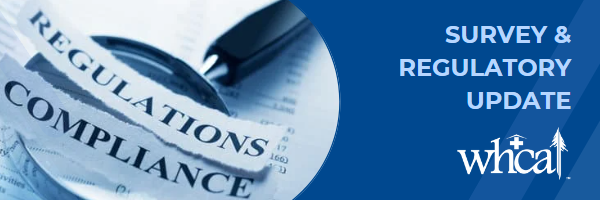Inspection Process: Resident Record Review
As part of the full inspection process, licensors will complete a full resident record review for each resident in the sample. While the record review is an important part of the inspection process, this step ideally is focused on collecting specific information to validate or clarify issues gathered during observations and interviews. It is important, then, that the provider ensures that the documents in a resident’s record are complete, accurate, and reflect the services offered and provided.
If the facility’s resident records are in paper format, it is highly recommended to have a system in place whereby outdated documents are archived; this will speed the licensors’ review process and offer easy access for staff when looking for specific documents. If the resident records are housed in an electronic format, be prepared to either share access with the licensors, or print off requested documents in a timely manner.
For each sample resident, the licensors will review the records to ensure the following:
- RESIDENT ASSESSMENT
- For residents who moved in within the last six months, the licensor will ensure that a pre-admission assessment was conducted before the resident moved in, and that the assessment was completed by a qualified assessor. They will also ensure a full assessment was completed within 14 days of moving in.
- Annual assessments completed. For residents receiving services on a Specialized Dementia Care Medicaid contract, the full assessment must be done every six months.
- Limited change of condition assessment is documented as needed.
- MONITORING RESIDENT WELL-BEING
- The assisted living has a system in place to capture changed in a resident’s condition; these changes are documented, and appropriate action is taken. These might come in the form of:
- Incident reports and/or investigations
- STOP and WATCH or other early change-in-condition detection formats
- Progress notes
- Faxes or electronic messaging to health care providers
- Hospital and clinic records
- NEGOTIATED SERVICE AGREEMENTS (NSA)
- For residents who moved in within the last six months, an initial service plan was in effect upon move-in and completed within 30 days.
- Updates are made to the NSA as needed.
- Contents meet the resident’s needs and preferences and include:
- Defined roles/responsibilities of the resident, staff, outside agencies, and resident’s family; alternate plans are in place when necessary.
- Approximate times and frequencies services are to be delivered
- Resident’s preferences for activities, and how/if those are supported.
- Resident arranged services and/or external health care providers are included, if applicable.
- MEDICATION RECORDS
- If the family participates in any way with medication management – that includes ordering, obtaining, and/or delivering medications, setting up medication organizers, and/or assisting/administering medications – the facility must have a family plan and an alternate plan, complete with directions, responsible party’s name and contact information, and signatures.
- Facility medication records for sample residents, including any prescribed medication orders, delegation documents and medication assistance/administration records (MARs). Complete documentation in MARs include medications taken, refused (with appropriate follow-up as needed), as-needed medications taken with appropriate follow-up.
The licensors may look at other residents’ records as well, likely on a limited focus based on interviews and/or observations. Should concerns arise from sample residents’ records, licensors may review other residents’ records to determine systemic breakdowns.
The licensing team may look at a closed resident record; this typically occurs when there are concerns about transfer/discharge, or an issue comes up during the inspection that warrants closer scrutiny into the discharged resident’s care and service at the facility.
Facility records are also part of the full licensing inspection. Reviewing facility-specific records may be required to complete data collection regarding a specific issue. These documents include:
- Incident/accident documentation including details, notification of relevant parties, investigation, and relevant prevention measures.
- Policies and procedures
- Financial records. These are rarely reviewed but may be looked at in the event care and services are not being met, or a specific complaint focuses on this topic
- Quality assurance committee notes (only to determine the existence of a QA committee and that it is operating in compliance with the regulations)
If you have questions about the inspection process in assisted living facilities, please contact Vicki McNealley via email, or call her at (800) 562-6170 extension 107.
Posted in Assisted Living, Survey & Regulatory

